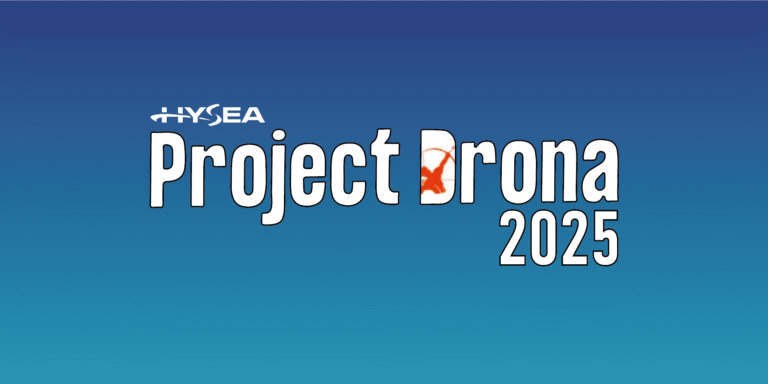
Project Drona 2025-26
Equipping faculty to create Day-1 ready IT talent
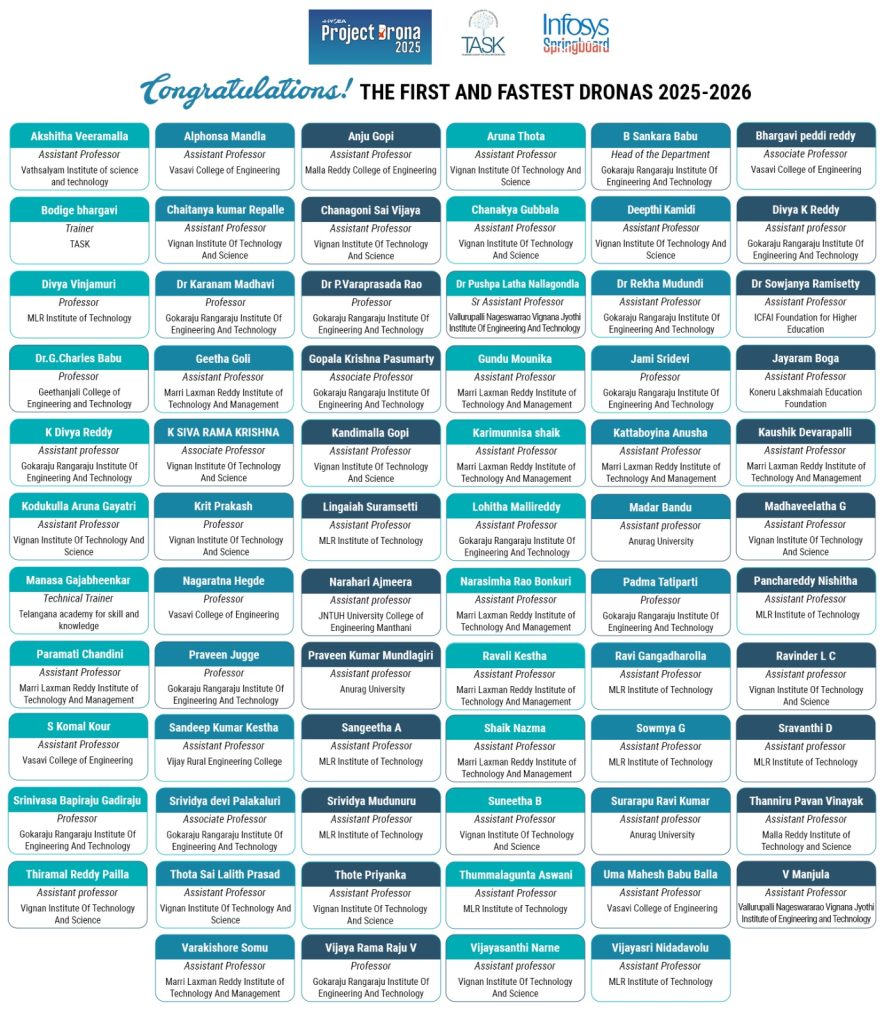
Project Drona is a key initiative under the strategic theme of HYSEA "Future Readiness" Council
At HYSEA, we envision a dynamic and future-ready talent ecosystem where innovation thrives, diversity is celebrated, and emerging leaders flourish. Our commitment extends beyond the present, shaping a transformative landscape for generations to come.

Promote Innovation & Inclusion

Support Start-ups via Market access; Investor ecosystem

Talent Transformation in emerging technologies

Mentorship to support emerging leaders
Vision
Empowering engineering faculty to nurture industry-ready IT talent across the state of Telangana by enhancing employability through cutting-edge skills, real-world exposure, and strong academia-industry collaboration.
Mission
To engage and empower over 1000 faculty members from Computer science, IT, AI/ML, and related disciplines across 500+ colleges in the state- through a scalable, evolving programs designed to drive continuous growth and impact.
Project Drona 2025 builds on the success of HYSEA’s (Hyderabad Software Enterprises Association) pilot initiative, offering an upgraded and more impactful learning experience for faculty, build on the outcomes and feedback of the previous version. In collaboration with TASK (Telangana Academy for skill and Knowledge) and Infosys springboard, the new version goes beyond foundational training to deliver a comprehensive, industry-aligned, and outcome-driven learning experience for faculty across Telangana.
 Hybrid Delivery
Hybrid Delivery
A blend of Self-paced curated online courses, masterclasses, in-person bootcamps, capstone project and live project reviews. Industry Expert Lectures
Industry Expert Lectures
A series of live virtual masterclasses by senior tech professionals on cutting-edge tools, technologies, and industry practices.
 Virtual Round Tables
Virtual Round Tables
Regular thematic discussions with leaders, allowing faculty to explore trends, case studies, and real challenges from the field. Capstone Project
Capstone Project
Faculty will work on multi-disciplinary project models designed to capture experiential and project-based learning goals.
 Community of Practice
Community of Practice
Faculty become part of a statewide knowledge-sharing network for peer learning and growth.
 Voice of DRONA
Voice of DRONA
Faculty who completed DRONA in earlier editions will share their success stories, implementation tips, and mentorship experiences.
Expected Learning Outcomes
- Analyse various emerging technologies
- Apply the concepts to solve problems
- Understand the program management process
- Demonstrate understanding of various roles in IT industry
Program Structure
Stage 1: Self Learning (4-6 Months)
- Self-learning through videos, pre-recorded sessions and study material available on the learning platform.
Stage 2: Capstone Project (1 Month)
- Capstone Project designed to integrate knowledge and skills acquired throughout self -learning. Faculty will form 10-12 member teams for capstone to facilitate peer learning.
- A team of 10-12 faculty members will work on a capstone project where they will get an opportunity to apply their learning and critical thinking skills and demonstrate their competency.
- Each group working on the capstone project will be assigned a mentor from the IT industry. This mentor will provide guidance, industry insights, and support throughout the duration of the project, ensuring participants gain industry exposure and valuable expertise.
Stage 3: Immersive Experience
- An immersive experience will be organized, featuring IT leaders from member companies. This initiative will provide participants with insights, industry expertise, and hands-on exposure to cutting-edge technologies and best practices.
Emerging Technology Tracks
Track 1 – Foundation for AI (4 Weeks- August 4th to September 1st)
Introduces fundamentals of AI, NLP, and Deep Learning. Covers AI types, architecture, NLP challenges and pipelines, and machine learning/deep learning algorithms such as CNN and RNN. Includes tools, techniques, and real-world applications.
Learning Outcome: Learners will grasp core concepts and algorithms in AI, NLP, and Deep Learning to solve practical problems in areas like computer vision, NLP, speech recognition, and autonomous systems.
Why AI?
• Business opportunities in AI
• Types and aspects of AI
• Technical view of AI
• Machine learning
• AI Architecture
• Frameworks, Tools for AI
- NLP and its applications
- Challenges in NLP
- NLP pipeline
- DL for NLP
- Tools and Platforms for NLP
- Why Deep Learning ?
- Deep Learning – Evolution and business potential
- What is Deep Learning ?
- Convolution Neural Network
- Recurrent Neural Network
- Deep Learning Network and Products
Track 2 - Citizen Data Science (10 Weeks- September 2nd to November 10th)
Equips learners with data science skills starting from Python programming to machine learning. Hands-on learning with Python is central throughout.
Learning Outcome: Learners gain foundational knowledge in Python, machine learning techniques, and hands-on experience in data science.
Prerequisites:
– Analytical thinking
– Comfort with technology
– Basic math and CS knowledge
- Use of python for data learning
- NumPy and Pandas for data analysis
- Matplotlib library for data visualization
- Overview of Scikit learn library for Machine Learning
- Basics of data visualization
- Matplotlib library: Basic plots- Box, Scatter, Line, Bar, Pie, Histogram, Pair plot
- Seaborn Library: BAsic graphs ansd few statistical plots
- Plotly Library: Basic plots and advanced plots like Choropleth Maps, Wordcloud
- Overview of EDA
- Collecting and Organizing Data
- Exploring and Summarizing Data
- Developing insights from the data
- Simpson’s paradox
- Introduction to Machine Learning
- Classification Algorithms
- Ensemble Techniques
- Clustering Techniques
- Introduction to artificial Neural Network: Multilayer Perceptron
Track - 3 Generative AI (9 Weeks- November 10th to January 12th)
Covers GPT models, GANs, Prompt Engineering, MLOps, and Agentic AI. Learners explore applications like code generation and AI-driven development with ethical guidelines.
Learning Outcomes:
– Understand and train GANs
– Build OpenAI-based NLP solutions
– Design effective prompts
– Apply Responsible AI principles
– Implement advanced ML/DL and MLOps
– Grasp Agentic AI concepts
Prerequisites:
– Knowledge of AI, ML, DL, NLP
– Familiarity with SDLC and frameworks
- Discriminative vs Generative
- Language models – Basics
- Transformer Model, Pretrained model
- GPT products and Demos
- Introduction to Generative models
- Generative Adversarial Network (GAN)
- Deep Convolutional GAN
- Challenges and performance issues in GAN models
- Primer
- What is Prompt Engineering
- Generative Pretrained models
- PE guidelines
- Text completion
- Code completion
- Principles of Responsible AI
- Need for Generating AI tools responsibly
- Need of ethics in Artificial Intelligence
- Core Ethical requirements of AI systems
- Build a retrieval augmented generation (RAG) system
- Significance and architecture of LLMs
- Limitations of LLMs
- Advanced techniques for Machine Learning with R
- Deep learning-based frameworks to model NLP tasks
- Challenges associated with unsupervised learning
- Integrate AI into AI development workflow
- Exposure to Gemini for Google Cloud (Duet AI) tools
- Enhanced productivity and efficiency in application development
- Theoretical aspects of MLOps
- Factors that affect ML models
- Different stages in MLOps
- Aspects of Agentic AI
- Use ChatGPT and Zapier to build your own agents
What's in it for faculty ?
- Get hands-on experience with Industry needs
- Emerging Technology – the Ability to code
- Business Sense & Customer Centricity
- Program Management with a focus on Professional Skills Development
- Exposure to nuances of the IT industry
Eligibility
Faculty members teaching Computer Science, Information Technology, or related departments in Engineering, BCA, MCA, B.Sc., and Polytechnic institutions across Telangana.
Why should faculty register ?
Artificial Intelligence (AI) and Machine Learning (ML) are rapidly transforming industries across the globe — from healthcare and finance to agriculture and education. These technologies are not just future-ready; they are shaping the present. For the next generation of engineers and technologists, understanding AI/ML is no longer optional — it’s essential for career success and relevance in a digital-first world.
As educators, faculty members play a pivotal role in equipping students with the knowledge, mindset, and skills required for this transformation. Faculty are not just instructors but role models and mentors, and their preparedness directly impacts their students’ job readiness on Day 1 of employment.
Project Drona, a joint initiative by HYSEA and TASK, empowers faculty with industry-grade knowledge and hands-on expertise in AI, ML, Data Science, and Generative AI. The comprehensive, structured curriculum — curated in collaboration with Infosys Springboard — is designed to help faculty not only teach these skills effectively but also advance their own professional development and growth.
We invite passionate faculty members to register for this transformational journey and become key enablers of Telangana’s AI-powered
Faculty first – Future forward
For more information, contact: [email protected]
Project Drona – A faculty immersive learning program for the IT industry needs
On the befitting occasion of Teachers’ Day, HYSEA launched “Project Drona” in collaboration with TASK, a faculty immersive learning program, powered by the Infosys Springboard platform. It was launched on Teacher’s Day with an aspiration to produce best-in-class faculty. The program is led by practicing industry experts from HYSEA member companies who will mentor the faculty in emerging technology skills and industry-centric approaches.
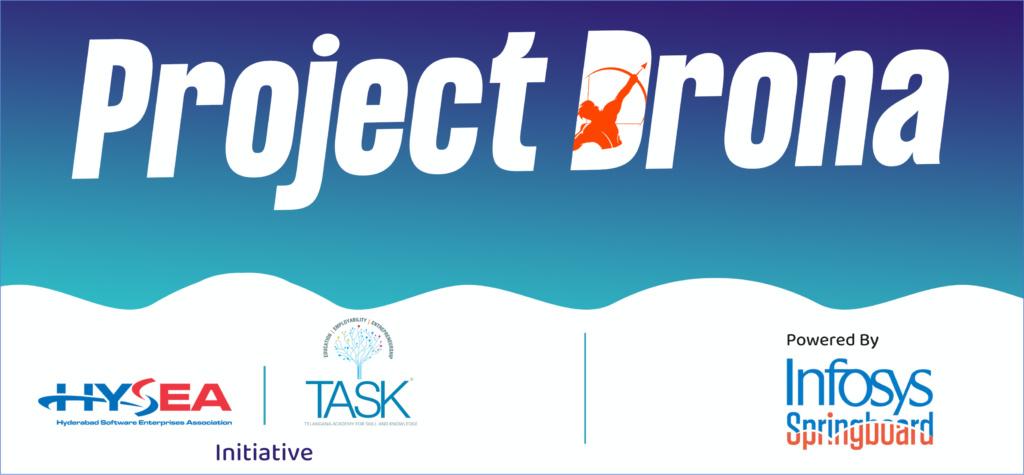
“Project Drona” received a special award for skill training / Industry – academia interface / Faculty Development initiatives by Govt of Telangana, Collegiate and Technical Education Department.
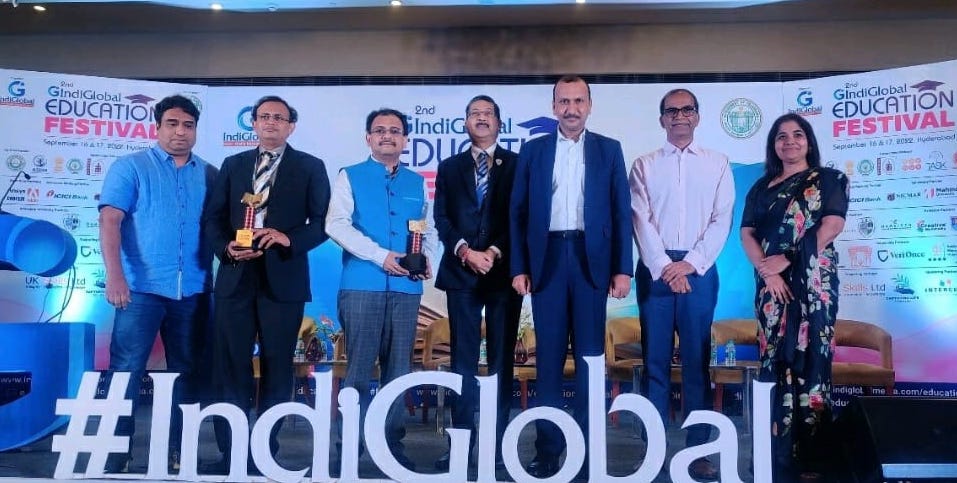
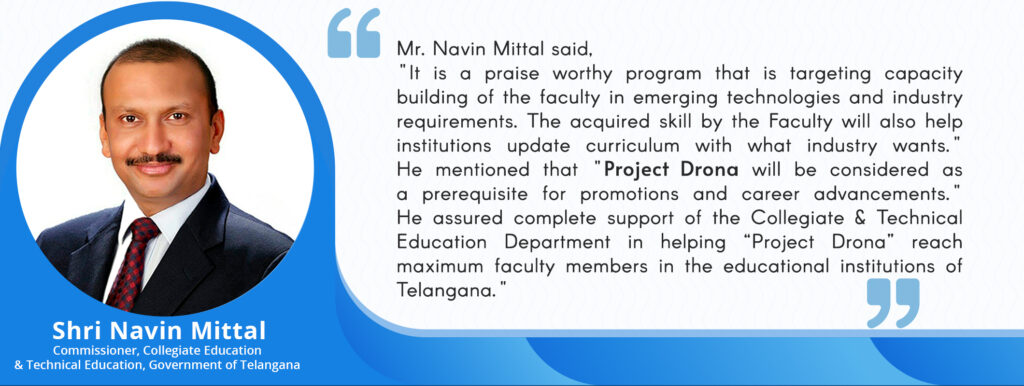
Charter
Project Drona an experiential learning program; aspires to produce best-in-class faculty.
“By mentoring faculty to be industry equipped, empowered, and infused with emerging technology skills & industry-centric approaches “
Faculty in due course teaches the student community to match the skill requirements of the IT industry.
Vision
Empower the Faculty in the state of Telangana in teaching Computer Science, IT, and related subjects with the most in-demand modern-day technology needs of the IT industry.
Mission
Reach and enrich at least 500+ faculty members across 250+ colleges in the state by July 2023. The program is designed to scale to 4x faculty and 4x colleges as it unfolds.
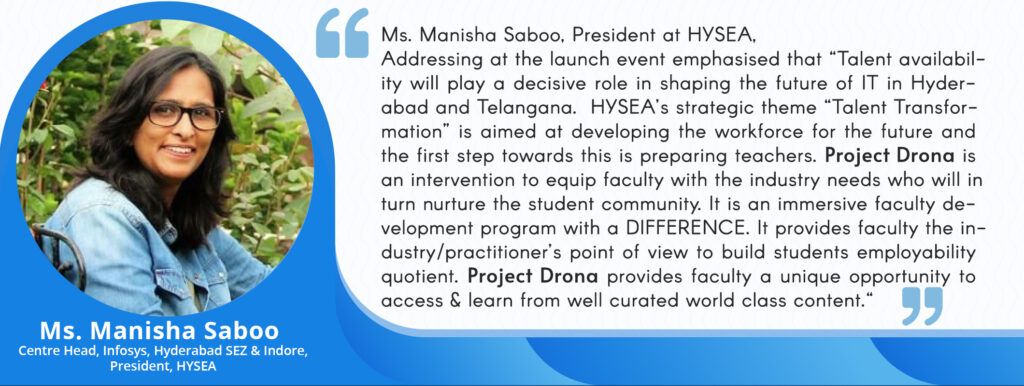
Enabling Partners
TASK, strategic academia connect partner with its ability to reach across the length & breadth of institutions in the state of Telangana
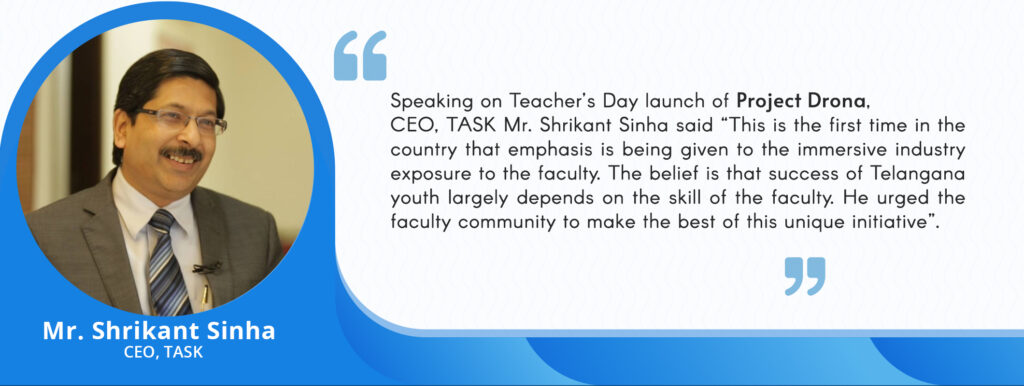
Infosys Springboard, content partner. The program is designed leveraging Infosys’s flagship Springboard platform that makes it an always-on, self-consumable, DIY, and cloud-deployed platform with best-in-class content
HYSEA, Mentor support by SME member company experts acting as Mentors
Program Chair
Sairam Vedam, Chief Marketing Officer, Cigniti Technologies, HYSEA Managing Committee member
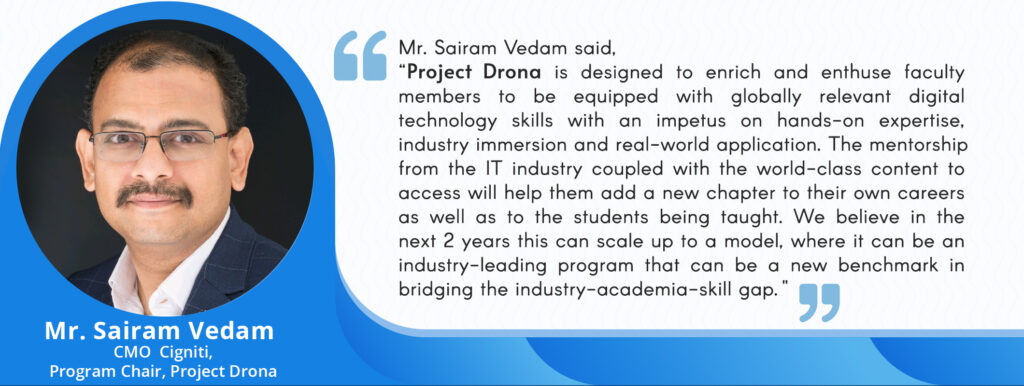
Other Mentors include industry emerging technology & program management practice, experts.
What’s in it for the Faculty?
- What’s in it for the Faculty?
- Get hands on with what Industry needs
- Emerging Technology – hands-on ability to code
- Business Sense & Customer Centricity
- Program Management with focus on Professional Skills Development
- Exposure to nuances of IT industry
Emerging Technology Tracks
The following are the three identified tracks of intervention and enablement that are being offered to the faculty members.
- Full stack development – Spring & Angular or Spring & React – 8 weeks
- AI & ML – 8 weeks
- Digital transformation with at least one industry/vertical use case – 4 weeks
Duration: Min 4 weeks – Max 12 weeks
Pre-requisites
Faculty in the state of Telangana teaching Computer Science, IT or related subjects in Engineering, BCA, MCA, B.Sc, and Polytechnic institutions.
What is the program execution plan?
- Faculty enrolls in a technology track.
- Learn the concepts in an online mode. A pool of faculty for each track will be available at stipulated hours (schedule will be given to students) for doubt clarification.
- Applies the concepts in a capstone project.
- The faculty makes a presentation of the capstone.
- Mentoring by industry emerging technology practicing experts who evaluate the capstone & offer feedback.
| Course Work | Certification Eligibility |
| 12 weeks of Course work | HYSEA Certified Faculty Member |
| 8 weeks of Course work | HYSEA Certified Faculty Member |
1st Cohort Commencement: October, 2nd, 2022. If you missed an opportunity to register for October 2nd, please register here for the next cohort here. We will write to you when the next cohort commences.
For further information on Project Drona, feel free to contact [email protected]. For any queries on the Infosys Springboard platform, reach out to [email protected]. In case you are unable to get a response within 2 working days, please write to [email protected].
